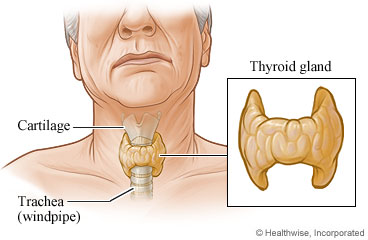
Your Recovery
Your doctor made a cut (incision) in your neck and removed part of your thyroid gland to find what is causing a lump or to remove a growth in the gland. The piece removed may have been large or small. Your doctor may have removed all of your thyroid if there was cancer or another problem.
The doctor did a test on a small sample of the tissue from your thyroid and closed the incision in your neck with stitches.
Keep the incision covered with the bandage and dry for 48 hours. You will likely have a tube, called a drain, in your neck. It lets fluid out of the cut. The drain is most often taken out before you go home. Ask your doctor how much drainage to expect.
You may go home on the same day or stay one or more nights in the hospital after surgery. You may be able to return to work or your normal routine in 1 to 2 weeks. This depends on whether you need more treatment, how you feel, and the kind of work you do.
Your doctor will check your incision about a week after surgery. You may need to take thyroid medicine. If you have thyroid cancer, you may need to have radioactive iodine therapy. Your doctor will talk to you about what happens next.
You will feel some pain for several days. You may have some nausea and general muscle aches and may feel tired for 1 to 2 days. You also may have a sore throat and sound hoarse.
This care sheet gives you a general idea about how long it will take for you to recover. But each person recovers at a different pace. Follow the steps below to feel better as quickly as possible.
How can you care for yourself at home?
 Activity
Activity
- Rest when you feel tired. Getting enough sleep will help you recover.
- Most people are able to return to work a few days after surgery, but this can depend on what type of work you do.
 Diet
Diet
- You can eat your normal diet. If your stomach is upset, try bland, low-fat foods like plain rice, broiled chicken, toast, and yogurt.
 Medicines
Medicines
- Your doctor will tell you if and when you can restart your medicines. He or she will also give you instructions about taking any new medicines.
- If you stopped taking aspirin or some other blood thinner, your doctor will tell you when to start taking it again.
- Suck on throat lozenges or gargle with warm salt water to help your sore throat.
- Be safe with medicines. Take pain medicines exactly as directed.
- If the doctor gave you a prescription medicine for pain, take it as prescribed.
- If you are not taking a prescription pain medicine, ask your doctor if you can take an over-the-counter medicine.
- If you think your pain medicine is making you sick to your stomach:
- Take your medicine after meals (unless your doctor has told you not to).
- Ask your doctor for a different pain medicine.
 Incision care
Incision care
- If you have strips of tape on the cut (incision) the doctor made, leave the tape on for a week or until it falls off. Or follow your doctor's instructions for removing the tape.
- Keep the area clean and dry.
- You will have a dressing over the cut (incision). A dressing helps the incision heal and protects it. Your doctor will tell you how to take care of this.
 Exercise
Exercise
- Avoid strenuous activities, such as bicycle riding, jogging, weight lifting, or aerobic exercise, until your doctor says it is okay.
Elevation
- You may be more comfortable if you keep your head up on a pillow when you lie down. Support the back of your head and neck with both hands when you sit up to prevent discomfort.
Follow-up care is a key part of your treatment and safety. Be sure to make and go to all appointments, and call your doctor if you are having problems. It's also a good idea to know your test results and keep a list of the medicines you take.
When should you call for help?
Call 911 anytime you think you may need emergency care. For example, call if:
- You have severe trouble breathing.
Call your doctor now or seek immediate medical care if:
- You have a lot of bleeding through the bandage.
- You have a hard time swallowing.
- You have trouble breathing.
- You have new or worsening pain.
- You have symptoms of infection, such as:
- Increased pain, swelling, warmth, or redness.
- Red streaks leading from the incision.
- Pus draining from the incision.
- A fever.
Watch closely for any changes in your health, and be sure to contact your doctor if:
- You're not getting better as expected.
- You notice a change in your voice.
Where can you learn more?
Go to http://www.healthwise.net/patientEd
Enter V203 in the search box to learn more about "Thyroid Surgery: What to Expect at Home".
Current as of: October 27, 2024
Author: Ignite Healthwise, LLC Staff
Clinical Review Board
All Ignite Healthwise, LLC education is reviewed by a team that includes physicians, nurses, advanced practitioners, registered dieticians, and other healthcare professionals.

